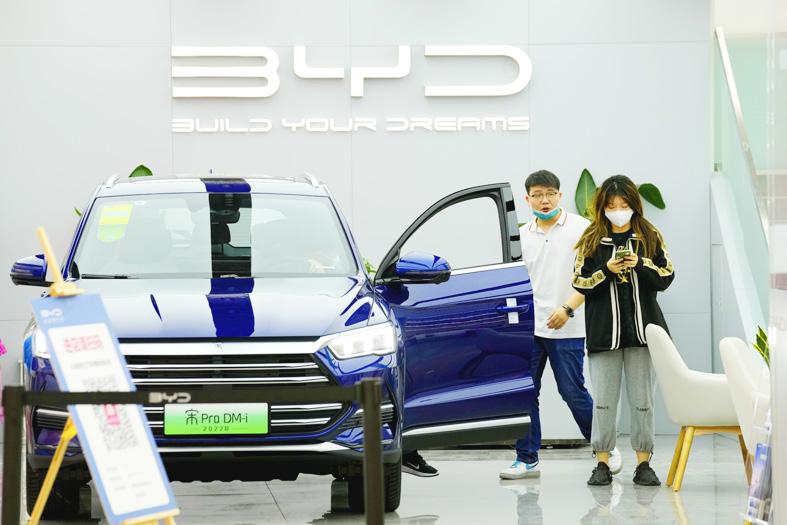Runaway raw material costs are fueling a “ridiculous” increase in the price of batteries for electric vehicles (EV), said Li Auto Inc (理想汽車) chief executive Li Xiang (李想), who took to social media in China late on Saturday to offer a rare insight into EV makers’ pain.
“The cost of batteries in the second quarter rose by a very ridiculous amount,” Li said on his official Sina Weibo (微博) account.
EV makers that have not raised prices yet are probably going to have to once their battery suppliers start charging more, he added.

Photo: AP
Li’s comments came after automakers in China from Tesla Inc to BYD Co (比亞迪) increased the prices of their vehicles.
Xpeng Inc (小鵬汽車) also hiked costs last week, saying in a note to customers that it would increase the price of its EVs by between 10,100 yuan and 20,000 yuan (US$1,587 and US$3,143).
Automakers in China, the world’s biggest EV market, are trying to lure more customers just as government subsidies for cleaner vehicles fall away. Combustion engine cars, still made by the likes of BYD and Geely Automobile Holdings Ltd (吉利汽車), are also facing higher running costs due to soaring oil prices.
Contemporary Amperex Technology Co Ltd (CATL, 新能源科技), the world’s largest battery maker, has noted the higher commodity costs, saying they are putting pressure on cell and automakers alike.
“The surge of upstream raw materials has caused certain pressure on downstream segments of the industry chain, including carmakers and battery makers,” a CATL spokesman said. “We adhere to the principle of providing customers with high-quality products while maintaining a reasonable level of profit.”
Smaller EV maker WM Motor Technology Co (威馬汽車) also cited raw materials prices and supplier constraints for its increases of between 7,000 yuan and 26,000 yuan after subsidies, according to a Sina Weibo post last week. Those hikes start on March 28.
Li Auto gets its batteries from CATL, as does WM Motor, among other suppliers, according to Bloomberg Intelligence.
Meanwhile, the Chinese government is telling its EV battery supply chain that it wants lithium prices to return to sustainable levels.
The government last week called in a range of market participants — from lithium producers to the main automakers’ association — to discuss “a rational return” for lithium prices, a statement from the Chinese Ministry of Industry and Information Technology said late on Friday.
Lithium has soared nearly 500 percent in the past year, adding to cost pressures for EV producers.
The seminar on Wednesday and Thursday last week was aimed at discussing surging costs and promoting what the ministry called the healthy development of the new-energy vehicle and battery sectors. It also addressed supply bottlenecks, how lithium is priced, as well as measures to steady prices and secure supply.

CHIP RACE: Three years of overbroad export controls drove foreign competitors to pursue their own AI chips, and ‘cost US taxpayers billions of dollars,’ Nvidia said China has figured out the US strategy for allowing it to buy Nvidia Corp’s H200s and is rejecting the artificial intelligence (AI) chip in favor of domestically developed semiconductors, White House AI adviser David Sacks said, citing news reports. US President Donald Trump on Monday said that he would allow shipments of Nvidia’s H200 chips to China, part of an administration effort backed by Sacks to challenge Chinese tech champions such as Huawei Technologies Co (華為) by bringing US competition to their home market. On Friday, Sacks signaled that he was uncertain about whether that approach would work. “They’re rejecting our chips,” Sacks

NATIONAL SECURITY: Intel’s testing of ACM tools despite US government control ‘highlights egregious gaps in US technology protection policies,’ a former official said Chipmaker Intel Corp has tested chipmaking tools this year from a toolmaker with deep roots in China and two overseas units that were targeted by US sanctions, according to two sources with direct knowledge of the matter. Intel, which fended off calls for its CEO’s resignation from US President Donald Trump in August over his alleged ties to China, got the tools from ACM Research Inc, a Fremont, California-based producer of chipmaking equipment. Two of ACM’s units, based in Shanghai and South Korea, were among a number of firms barred last year from receiving US technology over claims they have

It is challenging to build infrastructure in much of Europe. Constrained budgets and polarized politics tend to undermine long-term projects, forcing officials to react to emergencies rather than plan for the future. Not in Austria. Today, the country is to officially open its Koralmbahn tunnel, the 5.9 billion euro (US$6.9 billion) centerpiece of a groundbreaking new railway that will eventually run from Poland’s Baltic coast to the Adriatic Sea, transforming travel within Austria and positioning the Alpine nation at the forefront of logistics in Europe. “It is Austria’s biggest socio-economic experiment in over a century,” said Eric Kirschner, an economist at Graz-based Joanneum

BUBBLE? Only a handful of companies are seeing rapid revenue growth and higher valuations, and it is not enough to call the AI trend a transformation, an analyst said Artificial intelligence (AI) is entering a more challenging phase next year as companies move beyond experimentation and begin demanding clear financial returns from a technology that has delivered big gains to only a small group of early adopters, PricewaterhouseCoopers (PwC) Taiwan said yesterday. Most organizations have been able to justify AI investments through cost recovery or modest efficiency gains, but few have achieved meaningful revenue growth or long-term competitive advantage, the consultancy said in its 2026 AI Business Predictions report. This growing performance gap is forcing executives to reconsider how AI is deployed across their organizations, it said. “Many companies